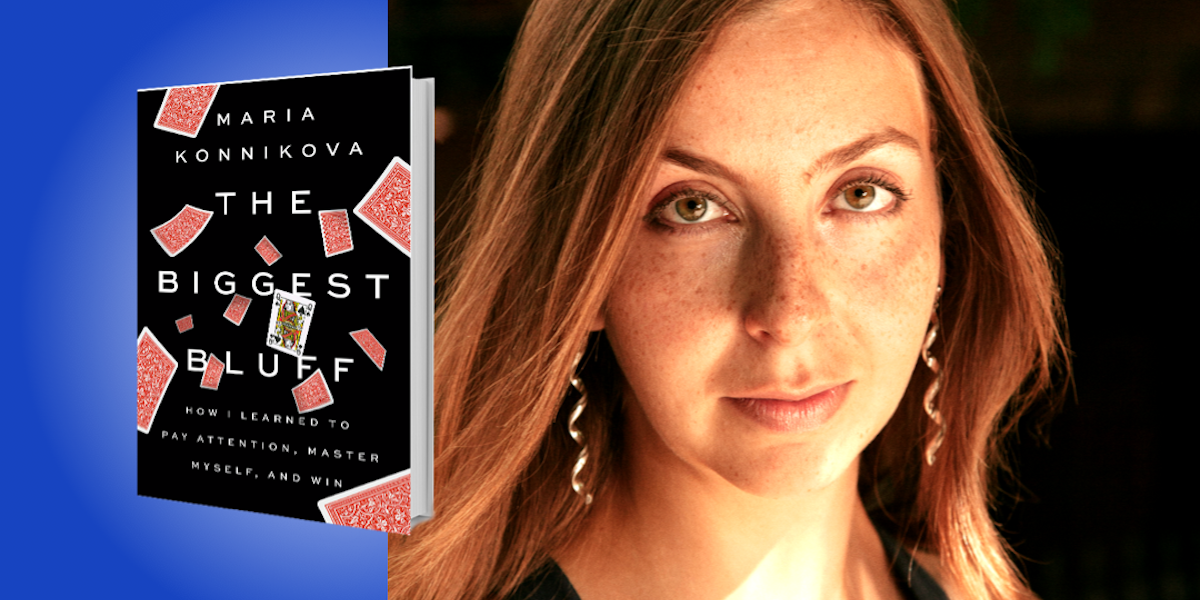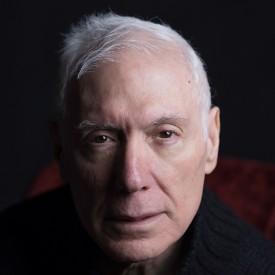Maria Konnikova is a regular contributing writer for The New Yorker, and holds a PhD in psychology from Columbia University. Her writing has won numerous awards, including the 2019 Excellence in Science Journalism Award from the Society of Personality and Social Psychology. Maria is also an international poker champion, and the winner of over $300,000 in tournament earnings.
Below, Maria shares 5 key insights from her new book, The Biggest Bluff: How I Learned to Pay Attention, Master Myself, and Win. Download the Next Big Idea App to enjoy more audio “Book Bites,” plus Ideas of the Day, ad-free podcast episodes, and more.
1. No bad beats.
For poker players, a “bad beat” is when you hold the best hand, and despite the odds being in your favor, you end up losing. Poker players love to tell bad beat stories: “Poor me… I got so unlucky.” But my coach, Erik Seidel, made me realize that telling these stories is toxic because you’re focusing on the wrong thing; you’re thinking about the outcome, rather than the process. We can’t control the outcome—nothing in life is 100% certain. All we can control is the decision process. In fact, if you’re not suffering from bad beats, you’re probably not taking enough risks. So just move on and focus on the next decision.
2. Pay attention.
Much like life, poker is a game of information. If you have an informational advantage, you’re going to win more often than your opponents—and you gain that informational advantage by paying attention. It sounds simple, but it’s one of the most difficult things I’ve ever had to do. It means being present, being mindful. Erik, for example, is always focusing on all the little things the other players are doing. While they’re on their phones or watching sports games, they’re failing to detect patterns and collect valuable information. Getting ahead means focusing on the here and now, then making conscious, informed decisions.
“Truly great minds are willing to admit that the world keeps changing, and that they often have to change along with it.”
3. Less certainty, more inquiry.
My poker coach, Erik Seidel, was once talking to a poker pro, who was telling him about a hand he’d played. He had been so certain about every single decision, but Erik looked at him and said, “Less certainty, more inquiry.” Erik wasn’t putting him down—he was teaching him about curiosity and intellectual humility. Never being completely sure means being willing to listen, to adapt, to change. Truly great minds are willing to admit that the world keeps changing, and that they often have to change along with it. We put a high premium on certainty and confidence, but that too often translates to ego and overconfidence. So be humble, and keep inquiring no matter what.
4. Learn to lose.
Early in my career, I was having breakfast with a legend of the game, Dan Harrington, and he asked me how everything was going. “Not great,” I said. “I’m playing online, and I keep losing.” Dan looked at me and said, “It’s good that you’re losing. If you’re winning early on, how in the world are you going to learn?” If everything is going well, you’re not motivated to figure out what is going on because, hey, everything is going well—why ask questions? And early on, you have no way of knowing where skill ends and luck begins. But if you start failing early on, you’re actually winning in a way, because you’re getting all this material that you can learn from, that you can use to improve your decisions and become better. In other words, failure can be one of life’s great teachers.
5. Always ask why.
Poker great Phil Galfond taught me to always ask why someone—including myself—is doing something. If you can figure that out, you can learn to take advantage of it at the poker table. And away from the poker table, it makes you a better listener; instead of judging someone and jumping to conclusions, you pause, reflect, and see them in a new light. As for myself, I had been tempted to simply memorize various poker strategies, but every action needs to be motivated. Asking why you’re doing something will force you to think every decision through, rather than doing something on impulse—or because someone told you to.
For more Book Bites, download the Next Big Idea App today:

































